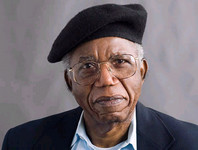
THE DEATH of Chinua Achebe has closed one of the most interesting chapters in the literary world and African politics. His meteoric rise as an African intellectual was not a coincidence, but a deliberate result necessitated and dictated by the dynamics of the times.
It would be wise to pause and reflect on the catalogue of lessons that can be drawn from his life and books.
Achebe's life was a living sermon about the fact that you do not need to be born in the middle class to prosper in life. But everyone needs a soul searching moment to discover what they are good at, and how to improve that talent. This conviction is vindicated by the fact that he published his seminal novel Things Fall Apart at 28 years.
Had he doubted himself and listened to the prophets of lies, that all that comes from Africa is inferior and uncivilised, there is no doubt that he would not have succeeded. But his book has been published in 50 languages and sold more than 12 million copies. His prolific writing - which produced other modern classics, including Arrow of God, Anthills of the Savannah and There Was a Country: A Personal History Of the Biafran War - taught us that all of us have a constructive role to play in transforming, building and developing Africa.
We cannot all be politicians, but we can take the initiative by ensuring that our calling serves humanity Through his writings, Achebe criticised corruption, nepotism and autocratic rule. He detested colonialism, oppression and segregation. That is why he was not given the red carpet treatment in his country of birth, Nigeria.
Like his fellow countryman Wole Sonyika and Kenyan contemporary Ngungi Wa Thiong'o have never been in the good books of the rulers in their native countries. Wa Thiong'o's books left no stone unturned in confronting the injustices of his country through his pen. This is evident in his works such as A Grain of Wheat, The River Between and Petals of Blood. It is through their powerful writings that the bad governance of African countries was vehemently opposed, challenged and disowned.
Their writings revealed that it is important to record our continent's experiences, irrespective of the fact that it is ridden with corruption, nepotism, coups and self-centred leaders. Achebe's name will remain alive for ever not only for swimming against the tide in opposing his fellow Africans but for the significant role he played, with other writers, such as Es'kia Mphahlele and BW Vilakazi, in developing their African languages and recording the transition.
Achebe and most early African writers of the early and mid-20th century have presented the current generation of writers and scholars with an immeasurable treasure trove of wisdom and experience. This will also serve as a significant source for future generations.
It would be appropriate to use Robert Kennedy's words from his visit to South Africa in 1966, to bid Achebe farewell: "Few will have the greatness to bend history itself, but each of us can work to change a small portion of events, and in the total of all those acts will be written the history of this generation."
By THEMBA J NK0SI
Themba J Nkosi is a journalism student at Rhodes University.
Source: SATURDAY STAR
